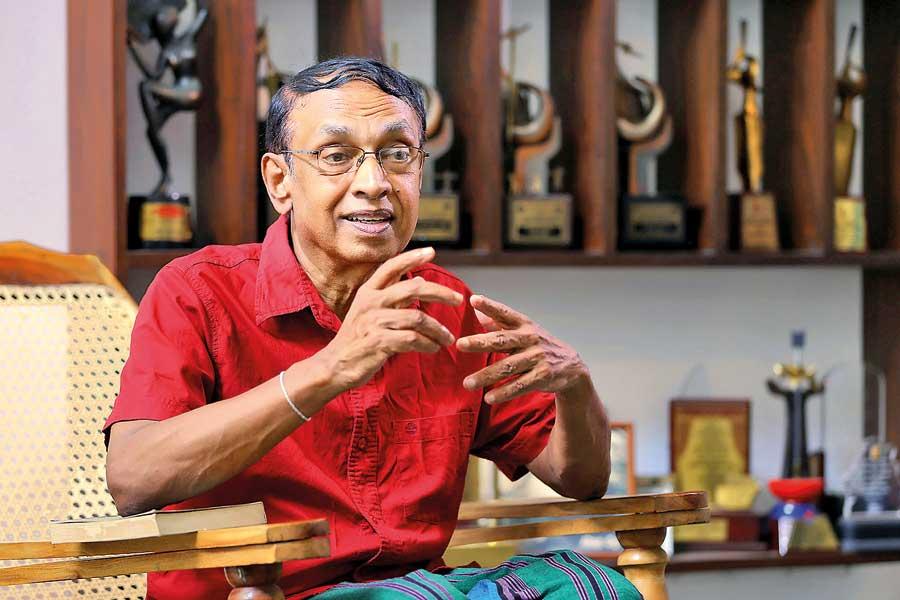11 Dec 2023 - {{hitsCtrl.values.hits}}

Photo by Nanditha Sirisena
There is one character that he portrayed on television — one which would define him as an actor — that best reflects who he was as the eldest brother of a rural family: Isa.
The character of Isa in Charitha Thunak spends a lifetime creating wealth through hard work, converting a dense forest land called Kokilana into a farm
On 7th of December 2023, we bade farewell to our father Suminda Sirisena. He was, however, much more than the patriarch of our small family. Suminda was a man who had touched the hearts of millions through a life dedicated to performing arts, and a consummate thespian who leaves behind a legacy marked with compassionate wisdom.
the patriarch of our small family. Suminda was a man who had touched the hearts of millions through a life dedicated to performing arts, and a consummate thespian who leaves behind a legacy marked with compassionate wisdom.
Such lofty achievements would not have been the instinctual aspirations of a child born in 1948 in Bossella, a remote and quiet hamlet nestled among the mountains of Kegalle. Our grandfather, Bulathgamuwage Singho, was a charismatic folk dramatist. It is probably his influence that kindled the flame of love for the stage in the heart of young Suminda. He was, however, never allowed to join his father’s drama group. Singho probably wanted his child to have a more materially successful life than that of a travelling artist.
It was academic success that brought young Suminda to Wijayabahu Central College in Tholangamuwa (now called Dudley Senanayake Central College). There he was exposed to a standard of education that was not available in places like Bossella. It was also there as an adolescent that he met Leela, the young lady who would later become his wife.
As fate would have it, the school had in its teaching staff talented artists such as Ariyawansa Ranaweera and Daya Alwis who went on to become stalwarts in Sinhala theatre. Guided by his schoolteachers, Suminda became one of the best actors in the vibrant school theatre scene of the 1960s.
Having completed his school education, Suminda moved to Colombo for work. Further education was not a luxury he could afford. As the first child to venture out of the village, he was determined to help his family claw their way out of poverty. Suminda’s first job was with Sri Lanka Railways. However, he could not resist scratching the artistic itch. A stint at the drama school of Dhamma Jagoda was the launching pad for his acting career that continued alongside a regular job in the railways.
Over the following decades, as a member of the drama groups of Ediriweera Sarachchandra and Jayalath Manoratne, Suminda was able to establish himself as one of the greats of modern Sinhala theatre. He was also one of the pioneering actors of Sri Lanka Rupavahini, thus present from the very beginnings of television drama in the country. As the medium matured, so did he; A string of critically acclaimed performances saw him become one of the most awarded actors in the 1990s and early 2000s.
This much is well known about Suminda’s illustrious career. For my brother and me, however, what was most impressive about our father was his qualities outside the limelight.
First, there was his quest for perfection. He studied his craft with a passion, reading both Bharata and Stanislavski with equal interest. He had a full collection of works by Shakespeare, comprising books he had gathered bit by bit from used bookstores. As a side project, he translated parts of Macbeth into lyrical, evocative Sinhala. His master’s thesis was on Oscar Wilde, which included a full translation of the masterpiece Salome.
Secondly, there was his thirst for knowledge. Suminda read widely, and owing to his varied interests, our home library was unusually expansive for a humble middle-class abode. We were fortunate to have the opportunity to read not only the Sinhala classics of Wickremasinghe, Jayatillake and Kumaratunga, but also the great Russian novelists in translation, as well as Dickens and Twain and in the original.
Finally, there was his selflessness. Suminda had arrived in Colombo with a single suitcase of possessions. Through grit and sheer hard work, he had been able to provide a modest yet comfortable life for his family. But his idea of family—in traditional Sri Lankan fashion—was something that extended far beyond the confines of wife and children. At any given time, we had uncles, aunts, cousins, and sometimes as many as three whole families living with us in the four-bedroom house in Gampaha. That place proved to be the base for many people who would subsequently blossom into learned professionals.
Though he worked tirelessly at the day job and spent many evenings on stage productions that made little financial sense, Suminda was not the one to let it affect his temperament. We have hardly ever seen him talk or act in anger. He was a gentle man who treated people with kindness and compassion. When people talk to us about our father, the first qualities that get mentioned are his friendliness and humility.
In that sense, Suminda was almost a man of a bygone era: the hard-working peasant who silently shouldered the burden of generations to come. There is one character that he portrayed on television — one which proved to be a pivotal role in his career and would define him as an actor — that best reflects who he was as the eldest brother of a rural family: Isa.
The character of Isa in Charitha Thunak – a teledrama directed by Thilak Gunwardena based on the novel by K. Jayatillake – spends a lifetime creating wealth through hard work, converting a dense forest land called Kokilana into a farm. Isa does not get to enjoy the benefits of this wealth though: it all goes towards helping the members of his family reach greater heights. In the process, the so-called “Duke of Kokilana” loses much of his wealth by the end of his life. In the closing minutes of the last episode, Isa contemplates:
“My desire for worldly possessions is diminished, it seems. My worldly obligations have now been fulfilled, I think. There is a peacefulness that was not there before in my mind, I feel. Some people have begun to call me the Sage of Kokilana.”
May Suminda Sirisena, our Sage of Kokilana, attain the peace of Nibbana.
05 Jan 2025 5 hours ago
05 Jan 2025 5 hours ago
05 Jan 2025 5 hours ago
05 Jan 2025 5 hours ago
05 Jan 2025 6 hours ago